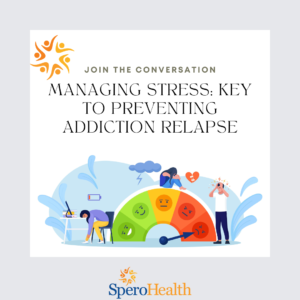
In the journey of recovery, understanding and managing stress is not just important—it’s crucial. Stress, an unavoidable part of human experience, often stands as both a precursor and a trigger for addiction and relapse. This blog post aims to explore the intricate relationship between stress and addiction, introduce effective mindfulness and relaxation techniques, discuss balancing life and recovery, and highlight community resources for managing stress.
Understanding Stress and Its Role in Addiction
Stress is the body’s response to any demand or threat. When faced with challenging situations, our bodies react by releasing hormones like cortisol and adrenaline, preparing us for ‘fight or flight.’ But when stress becomes chronic, it can lead to serious health problems—including an increased risk for substance use disorders.
For many, substances offer a temporary escape from stress. However, this coping mechanism can quickly spiral into addiction or trigger relapse in those in recovery. It’s a cycle that’s as dangerous as it is common.
Case Study: John, a 35-year-old recovering from opioid addiction, found himself reaching for his old vice after losing his job. The immense pressure and stress of unemployment overshadowed the coping strategies he learned in recovery. It was a wake-up call for John to prioritize stress management in his journey.
Embracing Mindfulness and Relaxation Techniques
Mindfulness is the practice of being fully present and engaged in the moment, aware of our thoughts and feelings without judgment. This practice offers a powerful tool for stress management, helping individuals recognize and cope with stressors in a healthy way.
Techniques to Try:
- Meditation: Sit in a quiet space, focus on your breath, and gently bring your mind back when it wanders.
- Deep Breathing: Practice breathing deeply from your diaphragm, allowing your breath to slowly fill your chest and belly, then slowly exhale.
- Yoga: Combine physical postures, breathing exercises, and meditation to improve mental and physical health.
- Guided Imagery: Visualize a peaceful setting or scenario to promote relaxation.
Studies have shown that these practices can significantly reduce stress, anxiety, and symptoms of depression, making them invaluable tools for those in recovery.
Balancing Life and Recovery
Recovery demands a delicate balance between everyday responsibilities and the ongoing work of maintaining sobriety. This balance is crucial for reducing stress and preventing relapse.
Strategies for Success:
- Set Healthy Boundaries: Learn to say no to commitments that overwhelm your schedule or emotional well-being.
- Prioritize Self-Care: Ensure you’re eating well, getting enough sleep, and engaging in regular physical activity.
- Structure Your Day: A predictable routine can provide a sense of stability and reduce stress.
Success Story: Emily, a single mother in recovery, found balance by setting clear boundaries with her employer, dedicating specific times for family, work, and recovery activities. This structure helped her manage stress and maintain sobriety.
Community Resources for Stress Management
No one should have to manage stress alone. Many community resources are available to offer support:
- Support Groups: Groups like SMART Recovery or Alcoholics Anonymous provide a community of support and accountability.
- Therapy: Professional counselors or therapists can offer personalized strategies for managing stress and addiction.
- Wellness Programs: Many communities offer free or low-cost yoga, meditation, or fitness classes aimed at improving mental health.
Accessing these resources can sometimes feel daunting, but reaching out for help is a brave and critical step toward recovery.
A Path Forward
Managing stress is not an innate skill—it’s learned and honed over time. With the right tools and support, anyone can learn to manage stress in healthy ways, reducing the risk of addiction relapse. We hope the strategies and stories shared here inspire and empower you to prioritize stress management in your recovery journey.
You Are Not Alone: If you’re struggling with addiction or stress management, Spero Health is here to help. Our team of dedicated professionals offers a range of services to support your recovery and well-being. Reach out to us today to learn more about how we can help you on your path to recovery.
We encourage you to share this post with friends and family who might benefit from its message. Together, we can build a supportive community focused on healing and recovery.